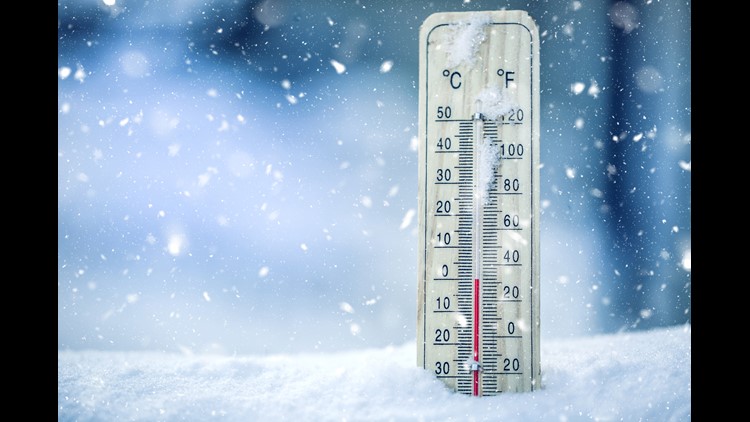HOUSTON - The bitter cold temperatures are expected to continue to affect millions of people this week and the American Red Cross has steps they should follow to stay safe during the ongoing chilly temperatures.
Elderly family and friends are the most vulnerable in the cold. Consider visiting them and bringing them some warm food.
WINTER SAFETY TIPS
- Wear layers of clothing, a hat, mittens and waterproof, insulated boots.
- Be careful when tackling strenuous tasks like shoveling snow in cold temperatures.
- Check on your neighbors, especially elderly people living alone, people with disabilities and children.
- Bring pets indoors. If they can't come inside, make sure they have enough shelter to keep them warm and that they can get to unfrozen water.
- Watch for hypothermia and frostbite. Hypothermia symptoms include confusion, dizziness, exhaustion and severe shivering. Frostbite symptoms include numbness, flushed gray, white, blue or yellow skin discoloration, numbness, or waxy feeling skin.
WINTER TRAVEL SAFETY
Stay off the road if possible during severe weather. If you have to drive in winter weather, follow these tips:
- Make sure everyone has their seat belts on and give your full attention to the road.
- Don't follow other vehicles too closely. Sudden stops are difficult on snowy roadways.
- Don't use cruise control when driving in winter weather.
- Don't pass snow plows.
- Ramps, bridges and overpasses freeze before roadways.
PREVENT HOME FIRES
With the cold temperatures there is often a rise in the number of home fires. Follow these tips to help prevent a fire in your home:
- Keep all potential sources of fuel paper, clothing, bedding, curtains or rugs - at least three feet away from sources of heat.
- Never leave portable heaters and fireplaces unattended.
- Place space heaters on a level, hard and nonflammable surface. Keep children and pets away from space heaters. Look for models that shut off automatically if the heater falls over.
- Never use a cooking range or oven to heat your home.
- Keep fire in your fireplace by using a glass or metal fire screen.
HOME HEATING SAFETY
Have furnaces, chimneys, fireplaces, wood and coal stoves inspected and cleaned before another winter of use. Test batteries in smoke and carbon monoxide detectors. Other good steps to make your home safe include:
- Make sure flashlights are available throughout the house and that they have fresh batteries. Winter storms can lead to power outages.
- Insulate the home by installing storm windows or covering the inside of windows with plastic to keep cold air out.
- Develop a fire escape plan and practice it with everyone who lives in the home.
- Have a disaster supply kit ready should winter storms hit. The kit should include a three-day supply of food and water per person, flashlight, battery-powered or hand-crank radio and extra batteries.
Other things to include for the winter include:
- Warm coats, gloves or mittens, hats, boots and warm clothing for all household members, along with extra blankets.
- An alternate way to heat the home, such as a fireplace, or wood or coal burning stove.
SPACE HEATERS
With temperatures dropping, many people are using alternate sources of heat to cut down on heating bills. The Red Cross recommends that people look for a model that shuts off automatically if the heater falls over. Other safety tips include:
- Place the heater on a level, hard and nonflammable surface in the home.
- Keep all potential sources of fuel like paper, clothing, bedding, curtains or rugs at least three feet away from space heaters, stoves, or fireplaces.
- Portable heaters and fireplaces should never be left unattended. Turn off space heaters and make sure any embers in the fireplace are extinguished before going to bed or leaving home.
- Keep children and pets away from space heaters.
PET SAFETY
Cold weather can be particularly difficult on our pets that rely on us for their well-being, especially for outdoor dogs and cats.
- If possible, bring your pets inside during cold winter weather. Move other animals or livestock to sheltered areas and make sure they have access to non-frozen drinking water.
- If the animals are outside, make sure their access to food and water is not blocked by snow drifts, ice or other obstacles.
- If pets cannot come indoors, make sure they are protected by a dry, draft-free enclosure large enough to allow them to sit and lie down, but small enough to hold in the pet's body heat. Raise the floor a few inches off the ground and cover it with cedar shavings or straw. Turn the enclosure away from the wind and cover the doorway with waterproof burlap or heavy plastic.
Source: American Red Cross
For local weather conditions, visit khou.com/weather



